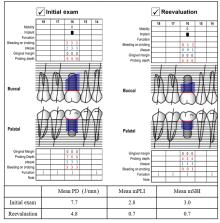| 1 |
LÄHTEENMÄKI H, PÄTILÄ T, RÄISÄNEN I T, et al. Repeated home-applied dual-light antibacterial photodynamic therapy can reduce plaque burden, inflammation, and aMMP-8 in peri-implant disease-a pilot study[J]. Curr Issues Mol Biol, 2022,44(3): 1273-1283.
|
| 2 |
LABH A K, BENNIS M A, MANI G. Prevalence of peri-implantitis and peri-implant mucositis among implant patients: a dental university based study[J]. J Long Term Eff Med Implants, 2021, 31(1): 59-64.
|
| 3 |
ALSADAT F A, EL-HOUSSEINY A A, ALAMOUDI N M, et al. Dental fear in primary school children and its relation to dental caries[J]. Niger J Clin Pract, 2018, 21(11): 1454-1460.
|
| 4 |
FU J H, WANG H L. Breaking the wave of peri-implantitis[J]. Periodontol 2000, 2020,84(1): 145-160.
|
| 5 |
MICHAUD R M, SCHOOLFIELD J, MELLONIG J T, et al. The efficacy of subgingival calculus removal with endoscopy-aided scaling and root planing: a study on multirooted teeth[J]. J Periodontol, 2007, 78(12): 2238-2245.
|
| 6 |
BÜHLER J, AMATO M, WEIGER R, et al. A systematic review on the patient perception of periodontal treatment using air polishing devices[J]. Int J Dent Hyg, 2016, 14(1): 4-14.
|
| 7 |
POORNIMA R, MEENA A K, PRATIBHA G. Comparison of root surface roughness produced by air polishing combined with hand instrumentation or ultrasonic instrumentation: an in vitro study[J]. Gen Dent, 2019, 67(4): 75-77.
|
| 8 |
MENSI M, FERES M, CALZA S, et al. One-stage full mouth instrumentation (OSFMI): clinical outcomes of an innovative protocol for the treatment of severe periodontitis[J]. J Int Acad Periodontol, 2020, 22(3): 129-136.
|
| 9 |
PARK E J, KWON E Y, KIM H J, et al. Clinical and microbiological effects of the supplementary use of an erythritol powder air-polishing device in non-surgical periodontal therapy: a randomized clinical trial[J]. J Periodontal Implant Sci, 2018, 48(5): 295-304.
|
| 10 |
NASCIMENTO G G, LEITE F R M, PENNISI P R C,et al. Use of air polishing for supra- and subgingival biofilm removal for treatment of residual periodontal pockets and supportive periodontal care: a systematic review[J]. Clin Oral Investig, 2021, 25(3): 779-795.
|
| 11 |
张佳丽, 姚 军, 诸葛继娜, 等. 赤藓糖醇对牙周致病菌抗菌性能的影响[J]. 上海口腔医学, 2019, 28(4): 362-367.
|
| 12 |
HASHINO E, KUBONIWA M, ALGHAMDI S A,et al.Erythritol alters microstructure and metabolomic profiles of biofilm composed of Streptococcus gordonii and Porphyromonas gingivalis[J]. Mol Oral Microbiol, 2013, 28(6): 435-451.
|
| 13 |
姚佳倩, 吴月波, 胡婷婷, 等. 赤藓糖醇喷砂辅助治疗慢性牙周炎临床效果及对牙龈卟啉单胞菌的影响[J]. 实用口腔医学杂志, 2022, 38(5): 623-627.
|
| 14 |
孟焕新. 牙周病学[M]. 4版. 北京: 人民卫生出版社, 2012.
|
| 15 |
谭葆春, 张 鹏, 李厚轩, 等. 内窥镜在牙周诊疗中的应用进展[J].中国实用口腔科杂志,2018,11(7):385-391.
|
| 16 |
KUANG Y C, HU B, CHEN J, et al. Effects of periodontal endoscopy on the treatment of periodontitis: A systematic review and meta-analysis[J]. J Am Dent Assoc, 2017, 148(10): 750-759.
|
| 17 |
卢静一, 王 雷, 郑 义, 等. 中重度多根牙牙周炎患者牙周内窥镜下非手术治疗的临床应用[J]. 吉林大学学报(医学版), 2019, 45(5): 1146-1151.
|
| 18 |
张杨珩, 李厚轩, 闫福华, 等. 牙周内窥镜辅助龈下刮治对残留牙周袋疗效的随机对照临床研究[J]. 华西口腔医学杂志, 2020, 38(5): 532-536.
|
| 19 |
HARREL S K. Videoscope-assisted minimally invasive surgery (VMIS) for bone regeneration around teeth and implants: a literature review and technique update[J]. Dent J, 2018, 6(3): 30.
|
| 20 |
裴喜燕, 阳 雯, 欧阳翔英, 等. 牙周内窥镜下根面清创与牙周翻瓣术疗效比较[J]. 北京大学学报(医学版), 2023, 55(4): 716-720.
|
| 21 |
WILSON T G JR. The positive relationship between excess cement and peri-implant disease: a prospective clinical endoscopic study[J]. J Periodontol,2009,80(9): 1388-1392.
|
| 22 |
LUPI S M, GRANATI M, BUTERA A, et al. Air-abrasive debridement with glycine powder versus manual debridement and chlorhexidine administration for the maintenance of peri-implant health status: a six-month randomized clinical trial[J].Int J Dent Hyg,2017,15(4): 287-294.
|
| 23 |
GERBO L R, LACEFIELD W R, BARNES C M,et al. Enamel roughness after air-powder polishing[J]. Am J Dent, 1993, 6(2): 96-98.
|
| 24 |
HÄGI T T, HOFMÄNNER P, EICK S, et al. The effects of erythritol air-polishing powder on microbiologic and clinical outcomes during supportive periodontal therapy: six-month results of a randomized controlled clinical trial[J]. Quintessence Int, 2015, 46(1): 31-41.
|
| 25 |
JENTSCH H F R, FLECHSIG C, KETTE B, et al. Adjunctive air-polishing with erythritol in nonsurgical periodontal therapy: a randomized clinical trial[J]. BMC Oral Health, 2020, 20(1): 364.
|
| 26 |
RENVERT S, POLYZOIS I. Risk indicators for peri-implant mucositis: a systematic literature review[J]. J Clin Periodontol, 2015, 42(): S172-S186.
|
| 27 |
NICOLAIDOU V, KOUFARIS C. MicroRNA responses to environmental liver carcinogens: biological and clinical significance[J]. Clin Chim Acta, 2015, 445: 25-33.
|
| 28 |
KHURSHID Z. Salivary point-of-care technology[J]. Eur J Dent, 2018, 12(1): 1-2.
|
| 29 |
DUARTE P M, SERRÃO C R, MIRANDA T S,et al. Could cytokine levels in the peri-implant crevicular fluid be used to distinguish between healthy implants and implants with peri-implantitis? A systematic review[J]. J Periodontal Res, 2016, 51(6): 689-698.
|
| 30 |
DARABI E, KADKHODA Z, AMIRZARGAR A. Comparison of the levels of tumor necrosis factor-α and interleukin-17 in gingival crevicular fluid of patients with peri-implantitis and a control group with healthy implants[J]. Iran J Allergy Asthma Immunol,2013,12(1): 75-80.
|
| 31 |
BELIBASAKIS G N, CHARALAMPAKIS G, BOSTANCI N, et al. Peri-implant infections of oral biofilm etiology[J]. Adv Exp Med Biol, 2015, 830: 69-84.
|
| 32 |
陈慧文, 胡 苡, 张卫平, 等. 种植体周围炎龈沟液中IL-1β、IL-6和TNF-α的表达[J]. 上海交通大学学报(医学版), 2020, 40(12): 1632-1636.
|
 ),Bin ZHAO
),Bin ZHAO







